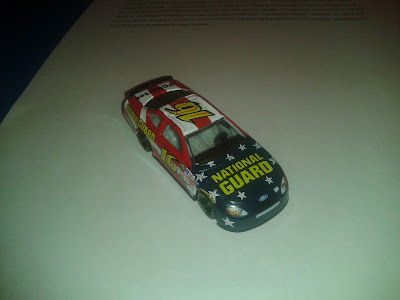 |
| I see a toy car. It is fun to send down slopes or gradients because it goes fast. It goes fast. Its got a cool “paint” job, and it was a gift. |
Wonder
is looking at this object and thinking, coming up with questions and trying to answer
them. For me it is hard to wonder about this object, I know it is a toy with
little purpose to me anymore. I still like how fast it goes down a slope, but
there is little for me to wonder. It has wheels so that they can rotate and the
object will then move. The windows are so that whatever may drive it can see
the road he or she is maneuvering. The seats hold passengers, seatbelts
restrain them, and doors and hoods protect the interior of the car. The paint
is mostly to show or define something. It is just a toy, for entertainment and
collectable purposes.
However,
if I were six I may have approached this toy with a bit more wonder. I would’ve
thought about more possibilities and imposed less boundaries on this toy. If it
can go downhill, can we send it downhill then uphill and finally no hill, watch
it fly and crash. This car is the vehicle that transports passengers into
different worlds, this car is the vehicle that can grow to life-size and crush
the miniature characters I’ve created in my head. I wonder if it can drive
across the surface of the water, or the bottom of the ocean. I would’ve played
with the car and created scenarios and stories in which the car went on some
awesome adventure. Imagination and wonder would be hand in hand and the car
would crash through both.
It feels
as if it is harder to wonder or imagine as we get older because we have been
given answers to all our questions or been told to grow up and make connections.
Wondering and playing with logical boundaries becomes a childish thing with
negative undertones. As we grow up it is looked upon with more respected eyes to
explain things in a way that is factual and makes sense. There are concrete
answers now and they replace the old, stretched ideas. Once we have learned
factual evidence, it is easier to spit that information out than try and think
about stretched or absurd ideas or possibilities.
“Concepts
create idols, only wonder knows.” –St. Gregory of Nyssa
I
think the quote means that the answer to anything is in wonder. Concepts are
easy answers that we create so that we can understand and have tangible
evidence. This evidence becomes what we worship or idolize. However, I don’t really
understand it past that. I have trouble coming up with an example that makes
the distinction between idols and wonder. Thus I do not really know if this is
true in my experience. What does wonder know? The explanation I gave
explaining all the true things about the car wasn’t me wondering, it was me
stating what I knew. When I thought about the aspect of wonder, imagination
took charge and came up with things that were not true. I do not know what wonder
knows.
